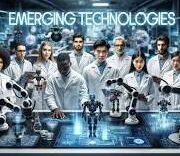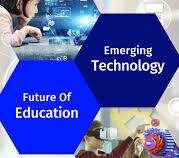Introduction:
In the fast-paced world of technology, innovation is a constant force propelling us toward new frontiers. Emerging technologies, by definition, represent the cutting edge of innovation, promising to reshape industries, enhance human experiences, and usher in unprecedented possibilities. From artificial intelligence (AI) and blockchain to quantum computing and biotechnology, this comprehensive article will delve into the realm of emerging technologies, exploring their potential impact on society, business, and the way we live.
-
Artificial Intelligence (AI):
Artificial Intelligence stands at the forefront of emerging technologies, transforming the way we interact with machines and process information. AI encompasses machine learning, natural language processing, and computer vision, enabling systems to perform tasks that traditionally required human intelligence.
a. Machine Learning: Machine learning, a subset of AI, empowers systems to learn from data and improve performance without explicit programming. This technology underpins various applications, from recommendation engines and predictive analytics to autonomous vehicles and facial recognition.

b. Natural Language Processing (NLP): NLP enables machines to understand, interpret, and generate human language. Virtual assistants, language translation services, and sentiment analysis in social media are just a few examples of how NLP is revolutionizing communication between humans and machines.
c. Computer Vision: Computer vision enables machines to interpret and make decisions based on visual data. From facial recognition for security purposes to object detection in self-driving cars, computer vision has far-reaching implications across industries.
Impact on Society: The integration of AI into daily life has already begun, with smart home devices, virtual assistants, and personalized content recommendations becoming commonplace. While AI promises increased efficiency and convenience, ethical considerations regarding privacy, bias, and job displacement must be addressed.
-
Blockchain Emerging Technologies:
Originally devised for cryptocurrency transactions, blockchain emerging technologies has transcended its roots to disrupt various industries. At its core, blockchain is a decentralized and distributed ledger that ensures transparency, security, and immutability of data.
a. Cryptocurrencies: Blockchain’s most famous application is in the creation of cryptocurrencies like Bitcoin and Ethereum. These digital currencies leverage blockchain’s decentralized nature to enable secure and transparent financial transactions.
b. Smart Contracts: Smart contracts are self-executing contracts with the terms of the agreement directly written into code. These automated contracts run on blockchain networks, eliminating the need for intermediaries and reducing the risk of fraud.
c. Supply Chain Management: Blockchain enhances supply chain transparency by recording every transaction, movement, or change in a product’s journey. This ensures traceability and authenticity, mitigating issues like counterfeit products and inefficiencies in the supply chain.
Impact on Society: Blockchain’s potential to revolutionize trust and transparency extends to areas such as voting systems, healthcare records, and identity verification. However, challenges related to scalability, energy consumption, and regulatory frameworks need to be addressed for widespread adoption.
-
Quantum Computing:
Quantum computing represents a paradigm shift in computing capabilities, leveraging the principles of quantum mechanics to perform computations at speeds unimaginable with classical computers. While still in its infancy, quantum computing holds the promise of solving complex problems currently beyond the reach of traditional computers.
a. Qubits: Quantum bits, or qubits, are the fundamental units of quantum information. Unlike classical bits, which can only exist in a state of 0 or 1, qubits can exist in multiple states simultaneously, enabling parallel processing and exponential computing power.
b. Quantum Supremacy: Quantum supremacy refers to the point at which a quantum computer can perform a specific task more efficiently than the most advanced classical computers. Achieving quantum supremacy is a milestone that marks the practical viability of quantum computing.
c. Applications: Quantum computing has the potential to revolutionize fields such as cryptography, optimization problems, and drug discovery. Its exponential computing power may unravel solutions to complex challenges that currently elude traditional computers.
Impact on Society: While the full-scale adoption of quantum computing is on the horizon, its implications for cryptography and data security are already prompting researchers to develop quantum-resistant algorithms. Ethical considerations and regulatory frameworks also need to be established as quantum computing becomes a reality.
-
Biotechnology and Genetic Engineering:
Advancements in biotechnology and genetic engineering are reshaping the healthcare landscape, offering personalized treatments, disease prevention, and unprecedented insights into the human genome.
a. CRISPR-Cas9: CRISPR-Cas9 is a revolutionary gene-editing tool that allows scientists to modify DNA with precision. Emerging technologies holds promise for treating genetic disorders, developing disease-resistant crops, and even addressing environmental concerns.
b. Personalized Medicine: The intersection of genomics and healthcare is giving rise to personalized medicine, tailoring treatments based on an individual’s genetic makeup. This approach has the potential to enhance treatment efficacy and reduce adverse reactions.
c. Synthetic Biology: Synthetic biology involves the design and construction of new biological entities for practical purposes. Applications range from biofuel production and environmental remediation to the creation of novel materials with unique properties.
Impact on Society: While biotechnology offers groundbreaking possibilities for healthcare, agriculture, and beyond, ethical considerations regarding genetic manipulation, consent, and equitable access to technologies must be carefully navigated. Balancing innovation with ethical standards is crucial in harnessing the full potential of biotechnology.
-
Internet of Things (IoT):
The Internet of Things refers to the interconnected network of devices, vehicles, and everyday objects embedded with sensors and software, enabling them to collect and exchange data.
a. Smart Homes: IoT applications are prominent in smart homes, where interconnected devices such as thermostats, lighting, and security systems enhance convenience and energy efficiency.
b. Industrial IoT (IIoT): In industrial settings, IoT is transforming operations through predictive maintenance, real-time monitoring, and data analytics. This enhances efficiency, reduces downtime, and optimizes resource utilization.
c. Healthcare: In healthcare, IoT facilitates remote patient monitoring, smart medical devices, and the seamless exchange of health data. This has the potential to improve patient outcomes and streamline healthcare delivery.
Impact on Society: The proliferation of IoT devices brings about concerns related to data privacy, security vulnerabilities, and the ethical use of personal information. Striking a balance between the benefits of connectivity and safeguarding user privacy is essential for the widespread adoption of IoT.
Conclusion:
Emerging technologies are the driving force behind the next wave of innovation, reshaping industries, economies, and societies at large. As artificial intelligence continues to evolve, blockchain transforms trust mechanisms, quantum computing unlocks new realms of computation, biotechnology pioneers personalized healthcare, and the Internet of Things connects our world in unprecedented ways. The convergence of these technologies holds the potential to address complex challenges and create a future where innovation is limitless.
However, with great power comes great responsibility. As these technologies advance, ethical considerations, regulatory frameworks, and inclusive access must be at the forefront of discussions. Striking the right balance between innovation and responsibility ensures that emerging technologies become tools for positive change rather than sources of unintended consequences. As we navigate the evolving landscape of technology, understanding, and harnessing the potential of these emerging innovations will shape the trajectory of our collective future.




